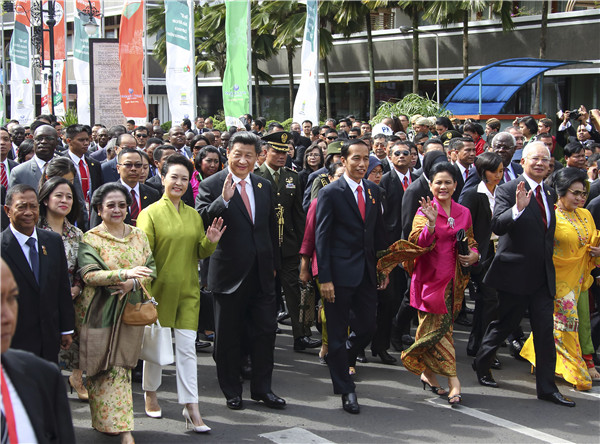Diplomacy displays clear global vision
Updated: 2016-02-15 08:19
By Zhang Ji(China Daily)
|
|||||||||
 |
|
Chinese President Xi Jinping, his wife Peng Liyuan, Indonesian Joko Widodo and his wife Iriana take part in a highly symbolic stroll with other Asian and African leaders to commemorate the historic 1955 Bandung Conference in Bandung, Indonesia, April 24, 2015. [Photo/Xinhua] |
China's diplomacy displayed more global vision in 2015 than ever before.
President Xi Jinping spent 42 days visiting 14 countries during the past year, and he also attended nine summits in various fields.
Xi's state visit to the United Kingdom greatly improved bilateral ties, and secured China a "global strategic partner". Shortly afterwards, the state leaders of Germany and France paid visits to Beijing.
Xi's visit to Russia and President Vladimir Putin's visit to China consolidated the two countries' strategic coordination in global affairs. While his visit to the United States deepened understanding of both him and China's rise in the US.
China pays special attention to its friendship with its old friends in Asia and Africa, and Xi also visited countries in Southeast Asia, Central Asia and Africa.
China commemorated the 70th anniversary of victory in the world's anti-fascist war as well as the 70th anniversary of the founding of the United Nations.
China is also demonstrating greater awareness and ability in its global strategic deployment and operations. It provides more solutions and undertakes more responsibilities than before, especially in the financial, information security and climate fields.
China took the lead in founding the Asian Infrastructure Investment Bank and the BRICS Development Bank, providing more financing options for developing countries. The Chinese currency has also been included in the International Monetary Fund's Special Drawing Rights currencies and China joined the European Bank for Reconstruction and Development, which have transformed its economic muscle into international influence.
China's Belt and Road Initiative serves not only China's neighbors but also the interests of African countries and developed economies in the West. The Initiative is popular among many East European countries. If implemented well, the Belt and Road Initiative can become bridges between the developing countries and developed countries.
China is also attaching more and more importance to new diplomatic thoughts and concepts, such as communities of common interests and communities of shared destiny, emphasizing countries need to strengthen coordination and deepen their mutual understanding on equal footings.
Chinese diplomacy stresses that big countries should avoid confrontation and seek win-win cooperation, and big countries should focus more on acting responsibly than their interests in their relations with smaller countries. China's selfless assistance to African countries in infrastructure construction, peacekeeping, development and public welfare shows its commitment to helping less-developed countries.
Xi's foreign visits are pragmatic and efficient. During his three-day stay in Russia in July, he took part in 25 activities and had seven conferences with Russian state leaders.
To boost global security efforts, Xi pledged to set up a $1 billion peace and development fund, found an 8,000-troop peacekeeping force, and provide $100 million in military aid to the African Union when he spoke at the United Nations summit. At the China-Africa summit, he pledged to provide another $60 million in free assistance to the African Union for peacekeeping endeavors.
China's diplomacy is increasingly relevant to its needs at home in restructuring its economy, upgrading its industry, boosting innovation and modern agriculture, and pursuing sustainable development and quality urbanization. Moreover, more Chinese cities, such as Zhengzhou in Henan province, Hefei in Anhui province, Suzhou in Jiangsu province and Wuzhen in Zhejiang province, hosted important diplomatic events in 2015.
In 2016, the G20 summit will be held in Hangzhou, capital of East China's Zhejiang province. That an increasing number of Chinese cities are appearing on the diplomatic stage shows China's confidence and the fast tempo of its internationalization.
In the future, China needs to cultivate more professional talents in technology, law, finance, economics, communication and information to support the fast development of its global diplomacy.
The author is a researcher at the French Studies Center of Fudan University.
Related Stories
Xi's whirlwind diplomacy sweeps China to center stage 2016-01-29 03:56
Xi's Mideast visit portrays all-round diplomacy 2016-01-20 08:18
Xi-style diplomacy in 2015 2016-01-13 14:51
Milestone year for China's diplomacy 2016-01-04 08:17
Today's Top News
Inspectors to cover all of military
Britons embrace 'Super Thursday' elections
Campaign spreads Chinese cooking in the UK
Trump to aim all guns at Hillary Clinton
Labour set to take London after bitter campaign
Labour candidate favourite for London mayor
Fossil footprints bring dinosaurs to life
Buffett optimistic on China's economic transition
Hot Topics
Lunar probe , China growth forecasts, Emission rules get tougher, China seen through 'colored lens', International board,
Editor's Picks

|

|

|

|

|

|







